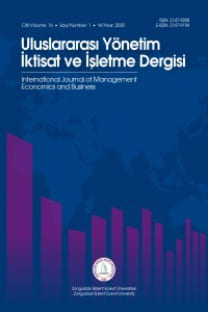KONUT YAPI KOOPERATİFLERİNDE GÜVEN İLİŞKİSİ VE YENİ BİR YAKLAŞIM: FONKSİYONEL DEĞİŞİM MODELİ
Güven, bireyler için temel bir ihtiyaçtır. Örgütlerle bireyler arasındaki bağların temelini güven oluşturmaktadır. Kooperatif örgütlerde ise güven, birden fazla değişkeni birbirine bağlamaktadır. Birey ekonomilerinin bir araya gelerek oluşturduğu kooperatif gruplar, kooperatif örgütten ihtiyaçları olan güveni sağladıkları takdirde kooperatif etkiye ulaşabilirler. Bu çalışmada Konut Yapı Kooperatiflerinde güven ilişkisi araştırılmış ve bu kooperatiflerde güven ihtiyacının maksimum düzeyde karşılanabilmesi için örgüt yapısı ve işleyişine dair yeni bir yaklaşım olan Fonksiyonel Değişim Modeli sunulmuştur. Araştırmada dördü bağımsız, üçü bağımlı toplam yedi temel değişken incelenerek dokuz hipotez oluşturulmuştur. Çalışma sonucunda yedi hipotez desteklenmiş, iki hipotez ise reddedilmiştir. Araştırmadan elde edilen bulgulara göre konut yapı kooperatiflerinde güven düzeyinin düşük olduğu saptanmıştır.
Anahtar Kelimeler:
Konut Yapı Kooperatifleri, Güven, Güven İlişkisi, Kooperatif Yaklaşımı, Fonksiyonel Değişim Modeli
TRUST CORRELATION IN HOUSING COOPERATIVES AND A NEW APPROACH: A MODEL OF FUNCTIONAL ALTERNATION
Trust is an essential need for individuals. Trust forms the basis of the relationship between organizations and individuals. In cooperative organizations, trust connects more than one variables. If cooperative groups, which are formed by coming together individual economies, provide the trust from cooperative organizations, they can attain the cooperative effect. In this study, trust relationship in housing cooperatives was researched. And presented model of functional alternation, which is a new approach, to organizational structure and functioning of in order to meet confidence need at maximum level in this cooperatives. In the research, nine hypotheses was formed by analysing seven basic variable, four of them independent and three of them depended. At the end of the research, seven hypotheses were supported and two hypotheses were rejected.It was found that, trust in housing cooperatives has an expressive relationship with marketing activites , loyalty, importance of activites and obtained performance. According to findings, trust to directors in housing cooperatives is at low levels. This result affected the partner's loyalty to cooperatives and the thoughts about being reference
Keywords:
Housing Cooperatives, Trust, Trust Relationship, Cooperative Approach, Model of Functional Alternation.,
___
- Akgül, A.&Çevik, O. (2005). İstatistiksel analiz teknikleri. Ankara: Emek Ofset Matbaası.
- Baş, T. (2006). Anket nasıl hazırlanır? Nasıl uygulanır? Nasıl değerlendirilir?. Ankara: Seçkin Yayınevi.
- Bayındırlık ve İskân Bakanlığı. (2010). Yapı kooperatiflerinin ve üst kuruluşlarının denetimi ile ilgili görevlendirilecek personel ve denetimi hakkında tüzük. Ankara.
- Börü, D. (2012). Örgütlerde güven ortamının yaratılmasında ilk adım. http://www.ecoturk.com.
- Demircan, N. & Ceylan, A. (2010). Örgütsel güven kavramı: Nedenleri ve sonuçları. Yönetim ve Ekonomi Dergisi, 10(2), 139-150.
- Günay, M. (2009). Konut yapı kooperatifleri misyonu gereği yarı özerk kamu kurumu statüsüne kavuşturulmalıdır. İstanbul Ticaret Üniversitesi S.B.E. Dergisi, 8(15), 33-49.
- ICA. (2010) Cooperative in housing – Starting housing projects. Sourcebook for Cooperatives in Housing, United States.
- İşcan, Ö. F. & Sayın, U. (2010). Örgütsel adalet, iş tatmini ve örgütsel güven arasındaki ilişki. Atatürk Üniversitesi İ.İ.B.F. Dergisi, 24(4), 195-216.
- Kramer, R. M. & Tyler T. R. (1996). Trust in organizations: Frontiers of theory and researh. London: Sage Publications.
- Lecompte, M. D. & Preissle, J. (1982). Problems of reliability and validity in ethnographic research. Review of Educational Research, 52(1), 31-60.
- McKnight, D. H., Choudhury V. & Kacmar, C. (2002). Developing and validating trust measures for e-Commerce: An integrative typology. Information Systems Research, 13(3), 334-359.
- Rutter, J. (2002). From the sociology of trust towards a sociology of e-trust. International Journal of New Product Depelopment & Innovation Management, 2(4), 371-385.
- Ward, P. & Meyer, S. (2009). Trust, social quality and wellbeing: A sociological exegesis. Development and Society, 38(2), 339-363.
- Williams, A. S. (2007). Statistics for Business and Economics. U.S.A: Thomson Higher Education.
- Yıldırım, A. & Şimşek, H. (2005). Sosyal bilimlerde nitel araştırma yöntemleri. Ankara: Seçkin Yayınevi.
- Yıldırım, M. (2010). Kamu yönetimine güven: e-Devlet açısından bir inceleme. C.Ü. İktisadi ve İdari Bilimler Dergisi, 11(1), 1-19.
- ISSN: 2147-9208
- Başlangıç: 2005
- Yayıncı: Zonguldak Bülent Ecevit Üniversitesi
Sayıdaki Diğer Makaleler
TALEBİN BELİRSİZ OLDUĞU TEDARİK ZİNCİRİ TASARIMINDA BULANIK ENİYİLEME YAKLAŞIMI
ORTADOĞU’YA YÖNELİK POLİTİKALAR, TÜRKİYE VE EKONOMİK İSTİKRAR
DENETİM ANLAYIŞININ DEĞİŞİMİ: YENİ SAYIŞTAY KANUNU ÜZERİNE DEĞERLENDİRMELER
YEREL YÖNETİMLERDE KATILIMCI/MÜZAKERECİ DEMOKRASİ SÜRECİNDE SİVİL TOPLUM KURULUŞLARININ ÖNEMİ
KONUT YAPI KOOPERATİFLERİNDE GÜVEN İLİŞKİSİ VE YENİ BİR YAKLAŞIM: FONKSİYONEL DEĞİŞİM MODELİ
